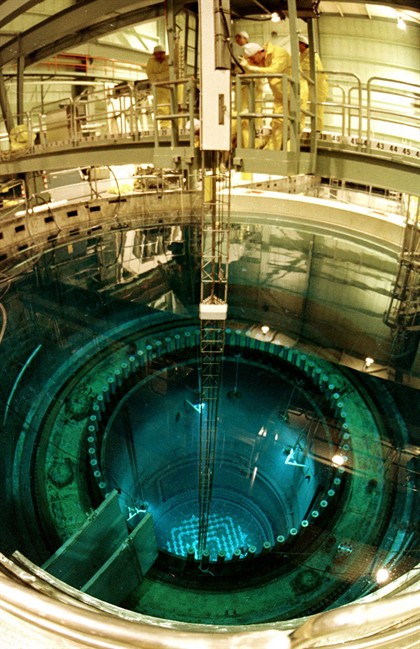MONTPELIER, Vt. – The owner of Vermont’s only nuclear power plant plans to move forward with a $60 million refuelling this fall despite uncertainty about whether the plant will be operating beyond March, when its current operating license expires.

New Orleans-based Entergy Corp. said company attorneys felt the firm would eventually win in its lawsuit against the state over the future of the Vermont Yankee plant.
Earlier this year, the Nuclear Regulatory Commission issued Vermont Yankee a 20-year license extension that would allow the plant to remain open until 2032. But the state, which claims it has jurisdiction over the future of the aging plant, wants it to close and has not acted on a state certification that is needed for Vermont Yankee to remain open. The plant has had a series of technical problems in recent years.
Last week, U.S. District Court Judge J. Garvan Murtha refused to issue an order that would keep the plant open while the underlying legal issues are decided. The case is scheduled to go to trial in September.
“Our board believes both the merits of the company’s legal position and the record strongly support its decision to continue to trial scheduled to begin on Sept. 12,” said Entergy CEO J. Wayne Leonard. “On that basis, the decision was made to move forward with the refuelling as planned.”
Vermont Law School professor Cheryl Hannah said a careful reading of Murtha’s decision denying Entergy’s request for a preliminary injunction showed the court was skeptical of the state’s case. Entergy’s lawyers undoubtedly reached the same conclusion, she said.
“Entergy had to make a business decision about whether to go forward with the refuelling ,” Hannah said. “I think it’s unlikely the plant will be shut down any time soon. Entergy owes its fiduciary duty to its shareholders and looking at where things stand at this time it was a reasonable business decision to make.”

Get weekly money news
Saturday had been the deadline for ordering the fuel rods that will be used in the refuelling , which is scheduled for October. The company had said it might close the plant if it were not given assurances it could operate while the legal case is decided. Last week Murtha refused to give that assurance.
Vermont Attorney General William Sorrell said Monday he wasn’t surprised by Entergy’s decision to spend $60 million on the refuelling .
“This is a company that has annual revenues in the $11 billion range,” Sorrell said. “I thought they were crying wolf in the preliminary injunction hearing.”
Sorrell said he was encouraged by the judge’s decision, because Murtha refused to issue the preliminary injunction.
“He said some things in his decision to reinforce what we have believed since the beginning,” he said. “This is a difficult case for both sides.”
Entergy maintains that only the federal government can regulate the operation of a nuclear reactor. The state maintains Entergy agreed to abide by a 2006 law that it needed state permission to operate beyond the life of its initial license.
Over the years, Vermont Yankee has had a series of technical problems that have led some to question its reliability. Among them was the January 2010 discovery that radioactive tritium was leaking from the plant and that company officials had made misleading statements about underground pipes that carried the tritium, a radioactive substance found in water.
A month later, the state Senate voted 26-4 against state relicensing.
Earlier this month, Sorrell’s office determined it would not file criminal charges against Entergy officials for the misstatements about the presence of underground pipes carrying tritium.
State officials maintain the issue is one of reliability, but Entergy claims the state’s concerns are about safety and federal law says safety issues can only be decided by the Nuclear Regulatory Commission, which in March granted the plant a 20-year license extension.
But state law requires that any electrical generator get a state certificate of public good from the Public Service Board. The state Senate voted last year to halt that process, effectively denying Vermont Yankee its certificate. The House has never acted.
Vermont Yankee is a 605-megawatt reactor in Vernon in the state’s southeast corner. Entergy said Monday that during a typical 30-day refuelling outage, approximately 120 fuel assemblies, or one-third of the reactor core, are replaced.
While the refuelling is under way, about 5,000 other maintenance chores are performed that can be done only when the plant is shut down.








Comments